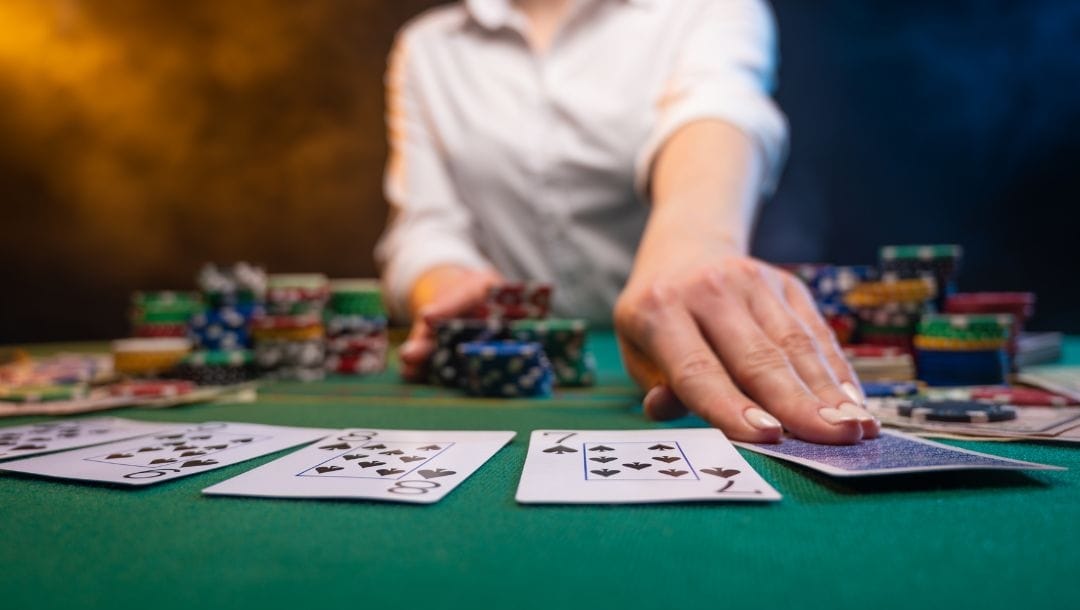Poker has a steep learning curve which can be discouraging to new players. We share what common mistakes to avoid if you want to get ahead in the game.
Common Mistakes New Poker Players Should Avoid

Poker is a mental game that demands strategic thinking and decision-making at the highest level. These skills don’t come from nowhere — they’re the result of dedication and hard work. It’s a long road from beginner to professional, and not everyone has the commitment. Maybe that’s why some players never seem to improve at online poker. But every player can get better if they have the will to do so. It all starts with ironing out those rookie errors that keep holding you back. Without further ado, let’s run through the most common mistakes you should (and could) avoid when you’re playing poker online.
Playing Too Many Hands
One of the best poker tips for beginners is not to play every hand for the simple reason that it’ll end up costing you money. Know when to hold your cards and when to fold them, as they say. Of course, it’s the most natural thing in the world for a beginner to want to play too many hands, either out of boredom or out of curiosity to see the flop and hope for the best. Not doing this is the first step towards becoming a more professional player. It’s essential to develop a working knowledge of the best and worst starting hands in, say, Texas Hold’em. Make a point of being able to identify which hands are the strongest and especially which hands are junk. Folding hands that aren’t worth playing will prevent you from running out of money.
Playing Too Few Hands
This poker tip follows on from the previous one. As soon as beginner players begin to distinguish between different poker hand strengths, they are prone to keep folding unless they know they have the strongest hand. Suddenly a player who played every hand turns into the ultimate nit. This, too, can cost you money because you won’t play enough hands to realize value. It will also make you predictable with the result that more experienced players will overfold to deny you value. To avoid these problems, loosen up. Widen your preflop ranges to strike a balance between value hands and bluffs. This will have the added benefit of making you harder to predict. Beyond that, it’s necessary to experiment. Poker is a game of risk, after all — you can’t win anything if you’re not in the game. Eventually, you’ll gain an understanding of how to exploit your opponent’s hand without relying on your own cards.
Limping
Indecision is a cardinal sin in poker that many beginners commit. Instead of taking control of the hand with an open raise, they limp into the pot. This hands the preflop initiative over to the aggressor, who, more often than not, will maintain control after the flop. Indecisive players will typically fold to this aggression and let the raiser take the pot.
Being Unobservant

Keep a close eye on your opponent. Observe their moves on the table and try to figure out their game plan. Analyze their style and betting frequencies to get ahead in the game. This is especially important when you’re playing online poker, where poker tools such as HUDs make it possible to analyze your opponent’s statistics for leaks. The good news is that the more you practice, the more observant you’re likely to become. Freeroll poker tournaments are a particularly good way to practice the observation skills you need to gain expertise.
Bluffing Too Much
A popular misconception based on watching people play live poker in movies is that the best poker players are expert mind-readers capable of bluffing their opponents out of money with every hand through some kind of psychic jiu-jitsu. The truth is less colorful than that. Bluffing is a poker strategy designed to draw your opponent into the pot or induce them to leave the table by creating the impression that your hand is better or worse than it really is. Bluffing too much is as bad as playing too tight because it makes you predictable, which makes it easier to take money off you. Base your bluffs on your table position, pot odds and the quality of the opponent you’re up against.
Bad Bankroll Management
The world of poker runs on money, and bankroll management is a skill that sets professional players apart from amateurs. That doesn’t mean you have to be loaded to join a table, but it does mean that you should be discerning as to which tables you join, regardless of whether you’re playing poker online or live. This is where the basic rules of responsible gambling come into play. Don’t get into pots that you can’t afford, and don’t play with money you can’t afford to lose. This is the purpose of keeping money aside to build a bankroll. A good general rule for cash games is to ensure that your bankroll is at least 20 times as much as the maximum table buy-in. For poker tournaments, make that 50 times your stack size.
Tilting

Poker is, above all, a mental game, which means you have to remain cool, calm and collected at all times. The trouble is that beginner poker players (and not only them) are subject to tilt. This is the poker expression for a confused mental state influenced by feelings of frustration. The consequence of tilt tends to be extremely poor, frequently aggressive decision making, which can lead to terrible poker mistakes. In this case, the best poker tip for beginner players is to learn to master your emotions and avoid tilt at all times; second best is to recognize the signs of tilt before it happens and leave the table for a while. It’s better to fold and walk away than to bet your bankroll away in a blind rage. Of course, being able to recognize (and exploit) impending tilt in others is a good skill to have as well.
Put Poker Tips Into Practice at BetMGM
Put poker theory into practice when you register at BetMGM. There are plenty of opportunities for you to improve your observation skills, manage your bankroll, control your emotions and raise your game! Cash games and poker tournaments are available every day with buy-ins to suit every player. The journey begins at BetMGM.


